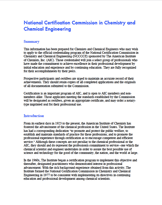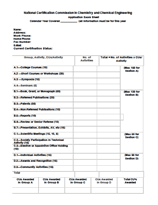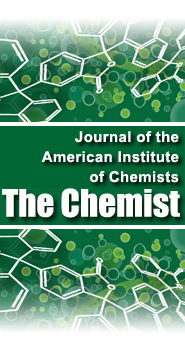National Certification Commission in Chemistry and Chemical Engineering
This information has been prepared for Chemists and Chemical Engineers who may wish to apply to the official credentialing program of the National Certification Commission in Chemistry and Chemical Engineering (NCCCCE) sponsored by The American Institute of Chemists, Inc. (AIC). Those credentialed will join a select group of professionals who have made the commitment to achieve excellence in their professional development by initial education and experience and by continuing education. They are fully recognized for their accomplishments by their peers.
Prospective participants and certifees are urged to maintain an accurate record of their achievements. They should retain copies of all completed applications and the originals of all documentation submitted to the Commission.
Certification is an important program of AIC, and is open to AIC members and non-members alike. Those applicants meeting the standards established by the Commission will be designated as certifees, given an appropriate certificate, and may order a notary-type imprinted seal for their professional use.
From its earliest days in 1923 to the present, the American Institute of Chemists has fostered the advancement of the chemical profession in the United States. The Institute has had a corresponding dedication "to promote and protect the public welfare; to establish and maintain standards of practice for these professions; and to promote the professional experience through certification as to encourage competent and efficient service." Although these concepts are not peculiar to the chemical professional or the AIC, they should and do represent the profession’s commitment to service--one which the chemical scientist and engineer undertakes in order to assure the best possible use of science and technology for the good of the community, the nation, and the world at large.
In the 1960s, The Institute began a certification program to implement this objective and thereafter, designated practitioners who demonstrated interest in professional advancement. With the rich background experience obtained from this activity, The Institute formed the National Certification Commission in Chemistry and Chemical Engineering in 1977 to be consistent with implementing its directives in continuing education and professional development among chemical scientists.
The purpose of the certification program is to recognize chemists and chemical engineers who have a certain basic level of education and/or experience and who have participated in professional career development and continuing education during the immediate past one to three years. The program encourages various means by which practitioners can maintain and improve their skills. It also serves as a vehicle for formally recognizing educational programs and other professional related activities that are dedicated to advancing the chemical scientist's or engineer’s current competence in his/her discipline.
Participation in the Commission's certification program is open to all practitioners of chemistry and chemical engineering, i.e., those who have a minimum of a bachelor's degree with a major in either of the two disciplines or in a closely related field from a four-year educational institution acceptable to the Commission. Where a degree is earned other than in chemistry or chemical engineering, the applicant must provide background documentation as evidence of their involvement in chemical sciences.
Membership in any organization is not a condition for participation.
Listed below are specific guidelines each applicant must follow for his/her application to be reviewed by the Commission:
- Please type or print neatly.
- Place a check mark indicating which field (s) you are applying.
- Please indicate the appropriate category/status for which you are applying [note that an individual may apply for certification as both a Certified Professional Chemist (CPC) and a Certified Chemical Engineer (CChE) which is termed DUAL.] Please note the appropriate fees and supply payment upon submission of application (s).
- Specify which calendar year a specific application is for. Use a separate application form for each calendar year for the immediate past one, two, or three years. Do not submit an application for a year which has not yet come to a close. If additional application forms are needed (use one form per year) make copies as necessary.
- Itemize all relevant activities in the four main Groups (A-D). Use of "See attached" or "See Curriculum Vitae" is not acceptable.
- Activities must be accompanied by appropriate documentation, as noted for each Group. Example: Group A. 1. College Courses (list them) and include a copy of your transcripts as your documentation; Group B. 2. Refereed Publications, etc., attach a copy of the publications you reviewed before publication, etc. Be certain to code the upper right hand corner of the support documentation, e.g., "Group A-1" for transcripts, "Group B-2" for refereed publication, etc.
- Deadline for receipt of applications and all necessary documentation is March 15 for Spring Review and August 15 for Fall Review. Early Submission is encouraged.
- All applications will
receive a preliminary review by the Executive Director to determine
that these guidelines have been met. Applicants who have not done so
will be notified promptly, and may correct deficiencies providing the
particular deadline has not passed.
In order to provide for the widest possible participation, the Commission has designed its credentialing program to recognize Chemists and Chemical Engineers at all stages of their development. Recent bachelor’s degree graduates from a recognized college or university may become Certifees-In-Training (CIT). Graduate students enrolled in a full time curriculum and others who may not yet fully qualify for certification may become Annual Enrollees (AE) if they acquire at least 100 Certification Units (CUs) in one year. Those who fully meet qualifications will be designated as CPC’s or CChE’s if they have acquired at least 300 CUs cumulatively during the prior three years.
- The purpose of the Commission’s certification program is to recognize Chemists and Chemical Engineers possessing at least a baccalaureate degree and who participate in professional development and continuing education activities. It is expected, that the program will encourage various means by which practitioners can maintain and improve their skills.
- The Commission annually shall determine the fees and other charges connected with its certification program. These fees are subject to approval by the AIC Board of Directors.
- The Commission shall arrange for suitable means to evaluate the qualifications of individuals seeking to be certified in their respective disciplines.
The recognized certifees will be listed
in a special Register section of the AIC Professional Directory. A hand-calligraphy
certificate will be issued. There is also a notary-type seal with expiration
stamp available for purchase. Certifees are urged to use the notary-type
seal on all official documents, such as letters, legal documents, and all
other forms of address as appropriate
All applicants are notified by the Executive Director following the review process of the Commissioners. Approved applicants will be sent certificates and notary-type seal order forms. Applicants who have not met certification requirements will be notified of any deficiencies. Any appeals from the decision of the Commission must be made to the AIC National Office in writing within 45-day of notification and will be heard by the AIC Board of Directors. Individuals who did not receive 300 CUs for the most recent three years can carry over the CUs awarded for the most recent two years and submit an application for the following year after it has come to a close.
The Commission has devised a system of Certification Units (CUs) by which it measures a Chemist’s or Chemical Engineer’s eligibility for participation in its credentialing outlets. Certification Units are generally equivalent to contact hours of participation in qualifying continuing education and related professional development activities. CUs reflect the Commission’s best estimate of representative effort for each of the indicated activities in the following sections:
Certification. Applicants must demonstrate the acquisition of at least 300 CUs during all or part of the three calendar year interval immediately preceding the year of application. Certification is then valid for a three-year interval beginning July 1, during which time certifees are encouraged to keep the Commission informed of continuing participation in qualifying activities by annually submitting the informational application. In this way their eligibility for recertification at the end of a certification triennium can be facilitated if they have acquired another 300 CUs during that time. Certifees must also remit an annual fee to maintain good standing and to assure a listing in the Register.
Annual Enrollment. Applicants may qualify for annual recognition commencing in mid-year if they have obtained at least 100 acceptable CUs during the immediately preceding calendar year. As soon as they acquire at least 300 CUs during the following 1-2 calendar years they can become eligible for certification.
Four major categories of Certification Units can be awarded to practitioners who wish to apply for certification or annual enrollment. These categories are:
Group A: Continuing Education
Group B: Publications, Reports, Presentations
Group C: Professional Society Participation
Group D: Other Professional Activity
In all cases, it is important that applicants submit appropriate documentation (as stipulated on the application form) to substantiate their participation in such activities. Because of the commonality of knowledge between Chemistry and Chemical Engineering, practitioners may acquire CUs in either discipline, irrespective of their field of involvement.
The CU amounts shown under the "Examples of Certifiable Activities" are the maximums number that can be counted for each group. The right to amend the certification unit system is reserved. It is not necessary to acquire units in each of the listed categories in order to qualify for participation.
Chemists and Chemical Engineers can have a wide range of activities to maintain their professional development. The following illustrations of such activities demonstrate the scope of certifiable activities to assist newcomers, and to guide applicants in complying with its requirements and in charting a future course towards certification and recertification. Examples of documentation are given in italics.
(maximum total of CUs is 150)
- College Courses. (10 CUs) These are bonafide offerings by institutions of higher learning for which academic credit is conferred. Such courses must relate to the professional enhancement of the practitioner, and cannot be credited if taken towards degree fulfillment. Although practitioners may audit a course, they must provide some official attestation as to the extent of their participation, (transcripts) to qualify for certification credit.
- Transcripts; Grade reports
- Credit can also be acquired for course instructors, but only to the extent such instruction is NOT a standard part of their job. Credit is awarded only for teaching special courses or for teaching a course for the first time.
- Short Courses or Workshops. (20 CUs) Some scientific and professional societies organize brief technical courses or workshops of several days duration in specialized areas of interest. These tend to be somewhat more concentrated than other day long programs (sometimes offering a hands on approach), although not with the breadth of coverage apt to be encountered in a regular college course. To receive maximum credit, a short course or workshop must be at least two days in length. Fractional equivalents will be awarded to those of shorter duration.
- Certificates of completion; Letters from organizers dated after the workshop ["Thank you for attending...etc."]; Lists of attendees; Letter from supervisor, organizer, etc.
- Symposia. (15 CUs) Many colleges and universities and some private non-academic organizations sponsor symposia and technical programs to develop familiarity with new techniques, methodology, or equipment. These generally are a day or less in length.
- Program copy; List of attendees; Letter from supervisor, organizer, certificate of completion, etc.
- Seminars. (5 CUs) Many institutions of higher learning and some other organizations
present seminars of relatively brief duration on topics of scientific
and professional interest. These generally run an hour to a half day
in length. See Symposia
(maximum total of CUs 120)
Note points will be divided by number of authors
- Books, Grant or Monographs. (50 CUs) {Thesis, C-ITs only}Maximum credit will be allowed for sole author of publication, while reduced credits may be awarded for one in which the author is part of a team. Copy of title page; Table of contents, and first page of chapter if applicable.
- Refereed Publications. (20 CUs/publication) Scientific and related journals that employ the referee system constitute a primary outlet for the dissemination of pertinent new technological information. Credit for each such publication will be allowed. For this, as for all other activities in the publications group, the Commission reserves the right to prorate the allowable number of certification units as a function of the scope and extent of author contribution for the publication under consideration. Reprint or copy of first page.
- Patents. (30 CUs) If the practitioner’s
name is not specifically identified with the patent, he/she may claim
appropriate credit for a contribution to its development, but must
be prepared to demonstrate the extent of such involvement. Credit for
patents will be awarded at the time of issue only.
- Copy of patent or first page of patent if extensive.
- Non-Refereed Publications. (10 CUs) Authorship of certain articles which appear in ACS local section publications, or other like outlets in which the referee process is not normally employed will be credited, depending on the technical scope of the published article and on the extent to which the applicant was a contributor. Copy of article, or first and last pages if extensive.
- Reports. (10 CUs/yearly) Many Chemists and Chemical Engineers develop formal technical reports (including grant proposals) for their employer, a client (if they are consultants), or a government agency as part of their employment. Certification Units will be awarded for such reports depending on their quality and scope. Reports may include technical developments, process changes, controls, evaluation of methodology, and the like. Credit will not be given for routine reports, such as quarterly and monthly reports, nor for routine analytical reports such as certificates of analysis. For reports to be considered for credit, their nature and existence must be documented or substantiated by supervisory personnel. If such work is classified or confidential, the applicant should have a supervisor or other responsible individual attest to such involvement in writing in sufficiently descriptive terms to identify the scope of the applicant’s contribution. Non-confidential: First and last pages of document, including a title page with all authors. Confidential: Letter from supervisor or client attesting to frequency and length of reports.
- Reviewer or Senior Referee. (10 CUs/yearly) Serving as a reviewer or senior referee on technical publications or on research or allied grants is a related publication activity for which the Commission is prepared to grant appropriate credit. This includes published book reviews. Review summary; Letter from editor acknowledging review or referee activity; Copy of published book review.
- Presentations. (15 CUs/50 max.) The presentation of a technical paper at a local, regional, or national scientific society meeting is an appropriate activity for Chemists and Chemical Engineers. Abstract printing does not also count as a publication. Credit is divided among the total number of authors. You do not have to present the paper to receive appropriate credit. This category also allows credit for the practitioner’s development of exhibits for displays at technical society meetings (including poster displays), or preparation of a technical paper by someone else, such as an associate, supervisor, or employee.
- Copy of abstract; Copy of program
with author or speaker listings; Letter from supervisor acknowledging
work on exhibit, including time spent on activity.
(maximum total of CUs is 50)
- Scientific Meetings. (15
CUs/national meeting) The national (15 CUs), regional (10 CUs), and
local (5 CUs) meetings of scientific and professional societies offer
a good opportunity for the Chemist and Chemical Engineer to keep abreast
of current technology and to upgrade skills. Attendance at the technical
sessions of such meetings is encouraged and can qualify for credit
in this category. However, participation in business sessions, non-technical
committee or other meetings, and the like does not qualify for certification
unit credit.
- Registration badge; receipt, certificate of attendance; etc.
- Society Participation. (15 CUs/activity) Appropriate credit will be given for serving as a member of a technical committee. To illustrate, service on a committee on analytical reagents or on nomenclature is an appropriate activity. In contrast, membership on a bylaws committee, or the like is not. Also, service as a member of an editorial board for a technical publication is valid, as is serving as the chair or organizer of a technical program.
- List of committee members on official stationary; Acknowledgment letter from officer; etc.
- Elective or Appointive Office Holding. (10 CUs/office/year) Election or appointment to office in scientific and professional societies is regarded as an indicator of professional development for which appropriate credit can be given.
- List of committee members on official
stationary; Acknowledgment letter officer
(maximum total of CUs is 50)
- Individual Activities. (15 CUs) List journals read during the year; no specific documentation is required for this category.
- Awards and Recognitions. (15 CUs)
Awards are an important indicator of professional achievement and maintenance
of competence and can be appropriately credited. However, awards received
for non-technical community service work, general service to the professions,
etc. do not normally fall within the scope of this category.
- Certificate; Acknowledgment letter; Announcement in newspaper or journal.
- Community
Activities. (up to 15 CUs per year) Appropriate credit will be given
for community projects entailing use of scientific and engineering
skills. Examples: serving as advisor for a Boy Scout merit badge in
chemistry, involvement with a community project on environmental pollution,
providing volunteer technical assistance to local law enforcement agencies,
etc.
- See Awards.
- See Awards.
- First Time Applicant for CPC or for CChE
- AIC Member: $150/application; per year
- Non-Member: $260/application; per year
- Current
Certifee or Annual Enrollee
- AIC Member: $75/application; per year
- Non-Member:
$185/application; per year




